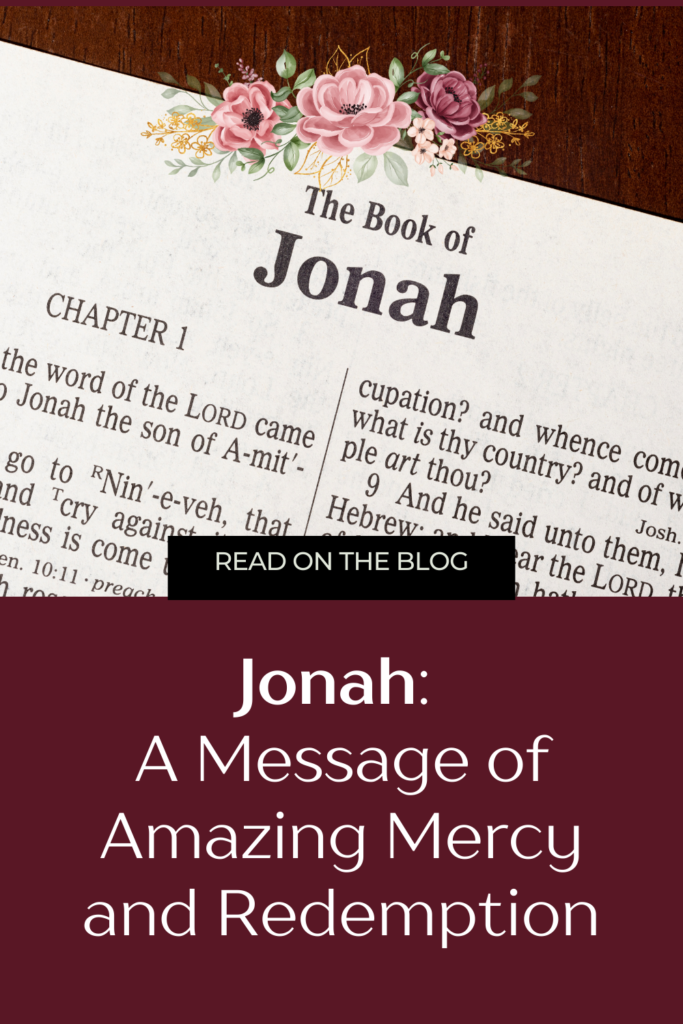The Book of Jonah is one of the most well-known and unique stories in the Bible. It tells the story of the prophet Jonah, who is sent by God to the city of Nineveh to call its people to repentance. However, Jonah initially runs away from God’s command, leading to a dramatic sequence of events. Ultimately, Jonah’s story is a powerful reminder of God’s mercy and forgiveness. This is not only toward the people of Nineveh but also toward Jonah himself. In this post, we’ll explore the key themes of Jonah, its significance, and how this book points to Jesus Christ.
Background of Jonah
Jonah was a prophet during the reign of King Jeroboam II of Israel (approximately 786-746 B.C.). His name means “dove,” and his story is unique in that it is less about the direct message of prophecy. And, more about Jonah’s personal journey and his interaction with God’s call. God commands Jonah to go to Nineveh, the capital of the Assyrian empire, and preach against its wickedness. Jonah resists, thinking that the people of Nineveh don’t deserve God’s mercy.
The story is well-known for Jonah’s attempt to flee to Tarshish, his being swallowed by a great fish (often referred to as a whale), and his eventual reluctant obedience in going to Nineveh. The city repents, and God shows mercy, sparking Jonah’s frustration and revealing God’s heart for compassion over judgment. The book ends with a conversation between God and Jonah. In which, God teaches Jonah about His love for all people, even those Jonah deemed unworthy.
Where You Can See Jesus in Jonah
In Jonah’s Three Days in the Fish:
The most obvious connection between the story of Jonah and Jesus is the three days Jonah spends in the belly of the great fish. Jesus Himself refers to this in Matthew 12:40, saying, “For as Jonah was three days and three nights in the belly of a huge fish, so the Son of Man will be three days and three nights in the heart of the earth.” Just as Jonah was in the fish for three days before being restored, Jesus would be in the tomb for three days before His resurrection. This foreshadows Jesus’ own death and resurrection, pointing to the hope of new life after three days of apparent defeat.
In God’s Mercy and Compassion:
Just as God showed mercy to the people of Nineveh, He extends mercy to us through Jesus Christ. Jesus’ life, death, and resurrection demonstrate God’s heart for forgiveness and reconciliation. Through Jesus, we can receive redemption, no matter our past, as God desires to save all people, not just those we deem worthy.
In the Reluctance of Jonah and Jesus’ Obedience:
Jonah’s reluctance to go to Nineveh contrasts with Jesus’ complete obedience to God’s will, even when it meant suffering and death on the cross. Jonah wanted to see Nineveh destroyed, but Jesus came to save the lost. This highlights the difference between human rebellion and divine obedience, showing Jesus as the ultimate example of submission to God’s will for the sake of others.
In the Need for Repentance:
The people of Nineveh’s repentance is a picture of what Jesus calls us to do in order to receive forgiveness. Jesus often preached repentance, urging people to turn from sin and return to God (Luke 13:3, Mark 1:15). Through repentance, we can experience the redemption that Jesus offers.
Key Themes in Jonah
- God’s Mercy and Grace: Jonah emphasizes God’s desire to show mercy, even to those who seem undeserving. This is clearly seen in Jesus’ ministry, where He frequently extended grace to sinners and outcasts, showing that God’s love is available to all who turn to Him in repentance.
- Obedience to God’s Will: Jonah’s disobedience teaches us the importance of trusting God’s plan, even when we don’t understand it. Jesus demonstrated perfect obedience to God’s will, even to the point of death on a cross, teaching us the power and importance of obedience (Philippians 2:8).
- Repentance and Forgiveness: Just as Nineveh’s repentance led to God’s forgiveness, we are called to repent and receive the forgiveness that is made possible through Jesus Christ. Through His sacrifice, we are offered a path of reconciliation with God.
How We Can Apply Jonah to Our Lives Today
- Reflect on God’s Mercy: Jonah’s story challenges us to reflect on God’s mercy and to extend that same mercy to others. Just as God showed compassion to Nineveh, He calls us to be agents of mercy and forgiveness. Are there people in your life who you may be withholding mercy from? Ask God to help you extend grace and forgiveness to them.
- Obey God’s Calling: Like Jonah, we may sometimes struggle with God’s calling, especially if it asks us to do something uncomfortable or difficult. But Jonah’s story teaches us that obedience to God is always the best choice. Even when we don’t understand why God asks us to do something, we can trust His plan. Are there areas of your life where God is calling you to step out in faith and obedience?
- Repentance Brings Restoration: The people of Nineveh repented and were spared from God’s judgment, demonstrating that repentance leads to restoration. Similarly, we are called to repent and turn back to God when we sin, knowing that He is faithful to forgive us. Have you recently asked God for forgiveness and turned from areas of sin in your life?
- Celebrate Jesus’ Ultimate Mercy: The story of Jonah points us to the ultimate act of mercy in Jesus Christ. Jesus’ death and resurrection offer us the greatest opportunity for redemption. As we live in light of this incredible gift, we should share the message of Jesus’ mercy with others, just as Jonah was called to share God’s message of salvation with Nineveh.
Conclusion
The Book of Jonah reminds us of God’s mercy, the importance of repentance, and the need for obedience. While Jonah struggled with God’s call to bring a message of repentance to Nineveh, God’s message of mercy ultimately triumphed. The story points us toward Jesus Christ, who offers mercy and forgiveness to all who come to Him in repentance. As we reflect on Jonah’s journey, may we be inspired to live with a heart full of mercy, to obey God’s calling, and to share the message of Jesus with the world.
Call to Action
What part of Jonah’s story resonates with you the most? How can you apply the lessons of mercy, repentance, and obedience to your own life? Share your thoughts in the comments below. Let’s engage in a conversation about how we can live out God’s call in our daily lives.






